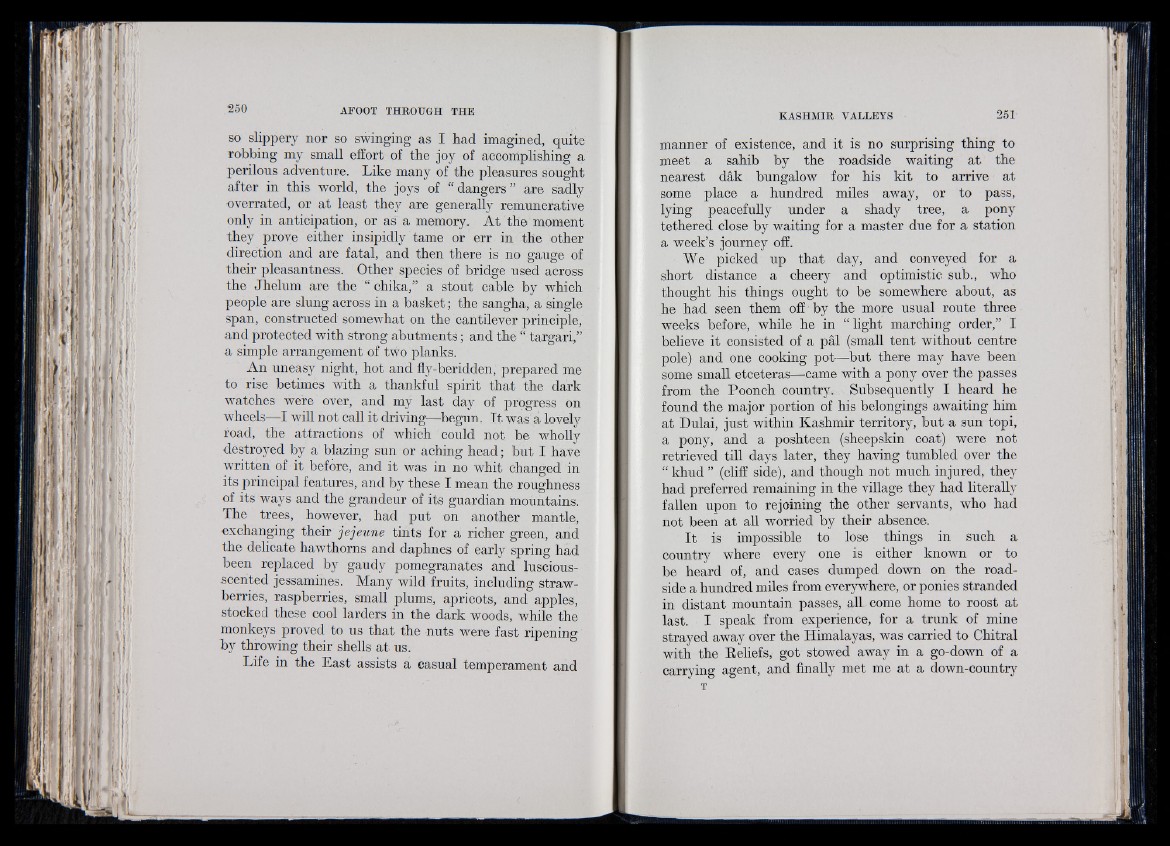
so slippery nor so swinging as I had imagined, quite
robbing my small effort of the joy of accomplishing a
perilous adventure. Like many of the pleasures sought
after in this world, the joys of “ dangers ” are sadly
overrated, or at least they are generally remunerative
only in anticipation, or as a memory. At the moment
they prove either insipidly tame or err in the other
direction and are fatal, and then there is no gauge of
their pleasantness. Other species of bridge used across
the Jhelum are the “ chika,” a stout cable by which
people are slung across in a basket; the sangha, a single
span, constructed somewhat on the cantilever principle,
and protected with strong abutments; and the “ targari,”
a simple arrangement of two planks
An uneasy night, hot and fly-beridden, prepared me
to rise betimes with a thankful spirit that the dark
watches were over, and my last day of progress on
wheels—I will not call it driving—begun. I t was a lovely
road, the attractions of which could not be wholly
destroyed by a blazing sun or aching head; but I have
written of it before, and it was in no whit changed in
its principal features, and by these I mean the roughness
of its ways and the grandeur of its guardian mountains.
The trees, however, had put on another mantle,
exchanging their jejeune tints for a richer green, and
the delicate hawthorns and daphnes of early spring had
been replaced by gaudy pomegranates and luscious-
scented jessamines. Many wild fruits, including strawberries,
raspberries, small plums, apricots, and apples,
stocked these cool larders in the dark woods, while the
monkeys proved to us that the nuts were fast ripening
by throwing their shells a t us.
Life in the East assists a casual temperament and
manner of existence, and it is no surprising thing to
meet a sahib by the roadside waiting a t the
nearest dak bungalow for his kit to arrive at
some place a hundred miles away, or to pass,
lying peacefully under a shady tree, a pony
tethered close by waiting for a master due for a station
a week’s journey off.
We picked up that day, and conveyed for a
short distance a cheery and optimistic sub., who
thought his things ought to be somewhere about, as
he had seen them off by the more usual route three
weeks before, while he in “ light marching order,” I
believe it consisted of a pal (small tent without centre
pole) and one cooking pot-—but there may have been
some small etceteras—came with a pony over the passes
from the Poonch country. Subsequently I heard he
found the major portion of his belongings awaiting him
at Dulai, just within Kashmir territory, but a sun topi,
a pony, and a poshteen (sheepskin coat) were not
retrieved till days later, they having tumbled over the
“ khud ” (cliff side), and though not much injured, they
had preferred remaining in the village they had literally
fallen upon to rejoining the other servants, who had
not been at all worried by their absence.
I t is impossible to lose things in such a
country where every one is either known or to
be heard of, and cases dumped down on the roadside
a hundred miles from everywhere, or ponies stranded
in distant mountain passes, all come home to roost at
last. I speak from experience, for a trunk of mine
strayed away over the Himalayas, was carried to Chitral
with the Reliefs, got stowed away in a go-down of a
carrying agent, and finally met me at a down-country